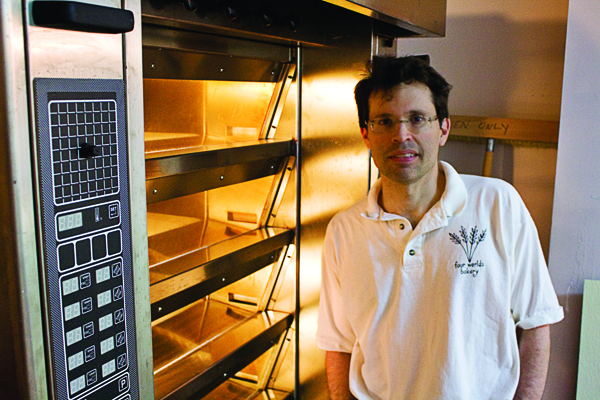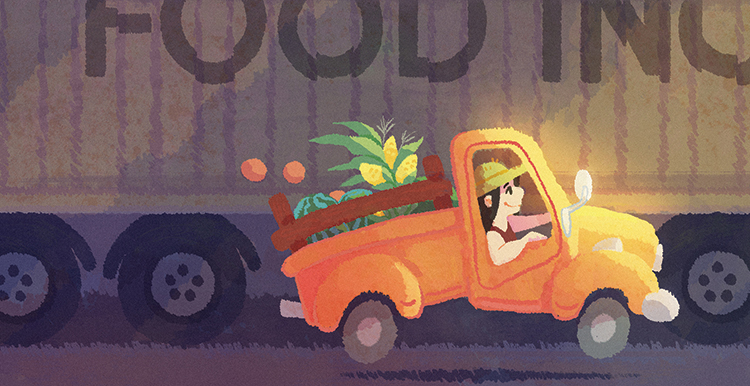 Michael Dolich sets out to revive the neighborhood bakery
Michael Dolich sets out to revive the neighborhood bakery
by Lee Stabert
On an unseasonably warm day in April, Four Worlds Bakery’s Michael Dolich is overseeing the installation of a serious oven. Three men (one of them an expert on this expensive and unwieldy piece of equipment) are straining their backs and sweating up a storm, moving a series of heavy racks made up of slender metal tubes into a box-like shape. In the middle of the floor is a massive pile of insulation. The bakery’s new crown jewel is a high-tech piece of machinery—a $30,000 oven that uses hot water to reach temperatures over 400 degrees—but it will be used to craft something simple, artisanal and perfect. Dolich hopes that humble, crusty perfection will be enough to lure people to this modest space on Woodland Avenue—Four Worlds’ first foray into life as a retail bakery.
Dolich did not start out as a baker. For 10 years he worked as a litigator, practicing family law, personal injury law and mediating disputes. Then, eight years ago, he spent a summer at Elat Chayyim, a Jewish retreat center in the Catskills. He was randomly assigned to work in the kitchen, baking fresh bread for 100 people at a time. He enjoyed the work, but as the summer wound down, he began to get a little antsy. “I quickly learned that if you bake fresh bread, people love it, whether it’s good or bad,” he explains. “I didn’t have a clue what I was doing, but I was making people really happy with it.”
But then Dolich tried something new: a recipe for sourdough bread. He went through the painstaking process of cultivating his own sourdough starter. That dough changed everything. “I was blown away by how fresh sourdough bread tastes,” he says. “I was instantly hooked. When I got back to the city, I couldn’t stop baking. I just baked, baked, baked.”
Suddenly, there was a decision to be made: accept breadmaking as a hobby, or take the leap and learn how to do it professionally. Dolich took a job at Baker Street in Chestnut Hill and worked there for a year. “I was learning a lot,” he says. “I was also reconditioning my body, learning how to work with my body—that was a process. It was painful, being on my feet all day long. It’s hard work.”
After a year spent back in the Catskills, Dolich went to work at Le Bec Fin’s bakery in Wayne, making croissants with a French master. With that new skill under his belt, he finally decided to strike out on his own, baking out of his house in West Philly.
Using the moniker Challahman, Dolich sent out a weekly menu via email. Word spread quickly. Eager diners would order online and pick up fresh bread on his porch every Friday. Eventually, due to increasing demand, the business expanded to three days a week. In 2008, Four Worlds moved into Kaffa Crossing Café, sharing the space and expanding operations. With access to a commercial kitchen, Dolich began wholesaling croissants to cafés around the neighborhood.
His croissants have gained a devoted following. “The trick to croissants is getting the right amount of fermentation in there,” explains Dolich. “The dough has to be super fermented in order to hold all that fat, and you want it to be really light and fluffy.” Each delectable crescent goes through a three-day process that involves the addition of old dough and a meticulous technique for sheeting and incorporating the butter.
Fermentation is Dolich’s passion—whether it’s his famous challah or those flaky croissants. “I love the taste of it,” he says. “It’s to the point now where, when I go out to eat, I never get bread. I can’t eat sandwiches out because to me it just tastes like cardboard. I’m so used to a really deep flavor in my bread. So, I’m milling my own grain and doing the best I can to get the best fermentation of the yeast. With the yeast, I’ve created an ecosystem that I keep alive; it’s great.”
It should come as no surprise that Dolich is obsessive about the ingredients he uses for Four Worlds’ breads. As mentioned, he mills his own grains—commercially ground products just weren’t up to snuff. Four Worlds’ grain mills are about as far from factory mills as they come. “They’re small and they’re slow, which is perfect,” says Dolich.
Back to that oven. If the goal is to make something that tastes like it came out of a wood-fired oven, why not just build one of those? “The problem with a brick oven is it’s so inefficient,” says Dolich. “You’ve got to heat it up—run a fire in there for eight hours; somebody’s got to tend that fire—and you only get maybe 10 or 11 bakes from one fire.” On the other hand, Four Worlds’ new oven is so efficient and well-insulated that it uses less energy to leave it on at night (maintaining the high heat) than to cool it down and reheat in the morning.
Dolich’s passion and thoughtful nature informs everything Four Worlds does. When the new retail location finally opens, it will keep old world-style bakery hours, something that might prove difficult for many modern consumers. “The concept we’re shooting for here—and time will tell if it works or not—is to train people when there’s fresh bread,” reasons Dolich. “That way, we only have to be open three hours in the morning and maybe two or three hours in the evening. So, people come in the morning between six and nine o’clock when there’s croissants, bagels and baguettes, fresh right out of the oven.” Or they’ll learn to stop in on the way home from work. “You’d be surprised to hear that when you go to retail bakeries, a lot of the stuff isn’t fresh—it’s baked maybe the evening before or the day before,” he continues. “Hopefully we get a line when we have fresh stuff, and then we sell out and we close. We have to train people and modify the way they buy bread.”
Four Worlds’ staff reflects Dolich’s unorthodox approach. One of his bakers is an artist, the other a writer. “This is art,” he insists. “It’s art you can eat. It’s challenging to hire people because you want artists, but you also need people who are very practical and good with their hands—so I would actually say it’s half-art, half-menial labor. But you know, that physical exertion adds to the art.”
Bread seems like such a simple thing. Maybe that’s why it’s so difficult to get it right—and so transcendent when you do. My personal experience with Four Worlds began with the challah. Picking up a beautifully braided, whole wheat loaf at the Fair Food Farmstand in Reading Terminal Market, I felt it give beneath my hands in a way that was simultaneously tender and substantial. Made—like all Dolich’s breads—with that fermented sourdough starter, the traditional Sabbath bread had the most tremendous depth of flavor, and a transcendent texture. After pairing it with my meal, I couldn’t resist breaking off a few more pieces, slathering them in local butter and honey. Oh, the magic of flour and water.
“I want people to get fresh, good quality bread,” says Dolich. “I want to bring back the neighborhood bakery. It’s an uphill battle, and the economics are really tough. I mean, best case scenario, if everything goes well, I’m still not going to make much money doing this, but it’s what I love.”
Four Worlds Bakery, 4634 Woodland Avenue, fourworldsbakery.com



